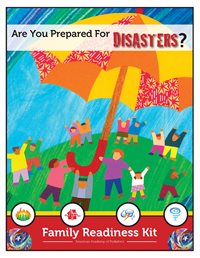
Download the PDF
Use this 10-page printable kit from the American Academy of Pediatrics to help you with key disaster planning steps.
Prepare yourself and your family by creating an emergency supply kit and a basic preparedness plan. Your kit should include items that will help you stay self-sufficient and your plan should include evacuation plans, a place to reunite with loved ones and an out-of-state contact person.
Be sure you have a phone charger and keep your phone charged at all times. You can sign up to follow NJOEM and receive text/email alerts from the National Weather Service:
The CDC has information on dealing with natural disasters for expecting parents, new parents and caregivers of infants. Visit their
Natural Disaster Safety for Expecting and New Parents pages for more information.